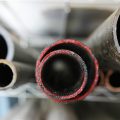Black iron pipes and galvanized pipes are two of the most common pipes used to transport liquids and gases. They may appear to be identical because both are made of steel. However, there is a distinct difference between black iron pipes and galvanized pipes.
This article will provide you with all the relevant information and differences between the two, along with which is better for use with air, water, and natural gas!
Table of Contents
- What is Galvanized Steel Pipe?
- What is Black Pipe?
- Black Pipe vs Galvanized Pipe for Natural Gas
- Galvanized vs Black Pipe for Air
- Black Iron Pipe vs Galvanized Steel Pipe for Water
- Key Differences Between Black Pipe and Galvanized Pipe
- Black Pipe and Galvanized Pipe Similarities
- FAQs (Frequently Asked Questions)
What is Galvanized Steel Pipe?
Galvanized steel pipe is corrosion-resistant steel that has a zinc material coating to make the pipe more resistant to corrosion. The zinc also prevents the build-up of mineral deposits that can clog the waterline.
What is Galvanized Pipe Used For?
The primary use of galvanized pipe is to supply water to homes and buildings.
What is Black Pipe?
Black steel pipe on the contrary is uncoated, and that is the key difference between black pipe and galvanized pipe. The dark color comes from the iron oxide formed on its surface during manufacturing.
What is Black Pipe Used For?
The primary purpose of black steel pipe is to carry natural gas into homes and businesses. The pipe is manufactured without a seam, making it a stronger and safer pipe to carry gas. The black steel pipe is also used for fire sprinkler systems because it is more fire-resistant than galvanized pipe.
Black Pipe vs Galvanized Pipe for Natural Gas
Black iron pipes and galvanized pipes are very similar with the key difference being that galvanized pipes have a zinc coating to protect them from corrosion. Black iron pipes are named as such due to the black iron oxide coating which forms when the pipes react with oxygen.
Due to the extra galvanization process used in the manufacturing of galvanized pipes, they are typically more expensive than black iron pipes. But, don’t be surprised, however, to see black iron pipes being pricier than galvanized pipes in some situations.
When it comes to the transportation of natural gas, many home improvements stores know black iron pipes are the most preferred pipes for natural gas and they, therefore, take that advantage to raise the prices.
One of the main differences between black and galvanized pipes is that black iron pipes are manufactured without a seam which is excellent in leak prevention, which is crucial when transporting natural gas.
Some homeowners and even professionals have been under the impression that galvanized pipe for gas is a bad idea, and it should not be used for natural gas transportation. Many even go-ahead to claim that it is illegal. Is there substance to these accusations?
Well, old and poorly made galvanized pipes were known for their coatings flaking off and plugging valves and orifices. That is however old news when it comes to modern-day galvanized pipes. Modern galvanized pipes can be as good as black pipes when used for transportation of natural gas, it is, therefore, a preference.
Both the International Residential Code (IRC) and Uniform Plumbing Code (UPC) do not prohibit the use of galvanized pipes for natural gas transportation. Local plumbing codes may however restrict it so check with your local licensed plumber.
Galvanized vs Black Pipe for Air
Due to black pipes being manufactured without a seam to promote leak prevention, they are generally the better choice when it comes to transporting air. Though galvanized pipes aren’t necessarily a terrible choice, in some instances, they’re known for their galvanized coating flaking off under high pressures and causing blockages in your air systems.
However, as explained already, this is more so a problem with older galvanized steel pipes, and all modern-day ones appear to have solved this issue.
Black Iron Pipe vs Galvanized Steel Pipe for Water
Black pipe for water is not a good idea as it rusts far too easily. Black iron pipe is suspect to corrosion while, on the other hand, galvanized pipes have been successfully carrying water to supply infrastructures for over 30 years due to their ability to resist corrosion.
Therefore, you will find galvanized steel pipe is commonly used in sewage plumbing, while you’d be concerned if you were to come across the black pipe.
Key Differences Between Black Pipe and Galvanized Pipe
Though, the difference between black pipes and galvanized pipe has been described throughout this article already. Let’s summarize the 6 key features that separate them:
- Corrosion resistance
- Manufacturing process
- Appearance
- Applications
- Durability
- Cost
Corrosion Resistance
The main difference between black pipes and galvanized pipes is their corrosion resistance. Black iron is manufactured using a mild steel compound with low-grade carbon content. This carbon addition can further strengthen the corrosion resistance of mild steel.
On the other hand, galvanized pipes are covered with a protective layer of zinc. This process of adding a layer of zinc is called galvanization, hence the name galvanized steel. The addition makes the pipes possess an ideal property of higher corrosion resistance.
The galvanization also helps to prevent the build-up of mineral deposits that may block the pipelines.
Manufacturing Process
Another key and significant difference between black iron pipes and galvanized pipes are their different manufacturing processes.
With galvanized pipes, the strip of iron goes through hot molten zinc. The zinc is then heated up from 820 to 860 degrees Fahrenheit. After the coating, it is then cooled down in a quench tank to avoid unwanted effects from the newly formed coating with atmospheric air.
Black iron pipes, on the other hand, are manufactured by stretching the steel out into a seamless tube or forcing the edges together and sealing them with a specific weld.
Appearance
When it comes to their appearance, galvanized pipes are lighter than black iron pipes. The iron oxide formed during the manufacturing of black iron pipes is what resulted in its gray appearance.
Galvanized pipes appear silvery-white in color due to their galvanization process. The zinc coating results in a far smoother and higher quality finish when painted.
Applications
Both types of pipes have distinct properties that make them ideal for certain applications. The seamless feature of black iron pipes makes it the best and safe option for transporting natural and propane gas, along with compressed air. They are also used for fire sprinkler systems because they are generally more fire-resistant than galvanized pipe.
Black iron pipes are unfortunately known to corrode from water easily, and that is where the usefulness of galvanized pipes comes into the picture. For well over 30 years, galvanized pipes are mainly used for carrying water to supply infrastructures.
Due to their ability to resist corrosion so well, they can also be utilized for countless outdoor and industrial applications, including outdoor railings, scaffolding frames, fences, sewage plumbing, road signage, and farm irrigation.
Durability
While it’s very accurate that steel is already a relatively durable material, galvanized pipes have additional strength due to their protective zinc coating. The coating takes on the damage rather than the steel itself and it will rust before the interior layer, which improves its durability.
This allows the integrity of the galvanized pipe to remain intact and therefore, increase its life expectancy for anything up to around 40 or 50 years. On top of this, galvanized pipes boast abrasive resistance, allowing them to resist cracking and scratches.
On the contrary, black iron pipes are uncoated and therefore less durable in comparison to galvanized pipes. As well, they corrode from water easily.
Cost
You could argue that black iron pipes are less costly than galvanized pipes. This is due to the absence of the zinc coating. Instead, black iron pipes are covered in iron oxide during their manufacturing process.
You should consider choosing black iron pipes over galvanized pipes if you have a budget in mind and if durability is not your primary consideration. However, sometimes you may find both types of pipes being a similar price.
Black Pipe and Galvanized Pipe Similarities
Given that they’re types both steel, of course, they have a few similarities and not only differences. The most notable similarity of all is that they can be cut using the same tool in some instances. Typically you will be able to use any of the following to cut either material:
- Tube cutting tool
- Hacksaw
- Reciprocating saw
- Grinder
Tube Cutting Tool
A tube cutting tool is a small and economically-priced tool used by plumbers to cut through smaller galvanized and black piping. With its sharp, protruding blade, this tool allows for clean and accurate cuts, even in a confined space.
The clamping device activates the cutting blade with the twisting vice-like clamp once the tool is placed on the material to be cut. Each turn puts additional pressure on the pipe, sending the sharp circular blade or cutting surface deeper into it. These effective tools are available in larger sizes as well more larger pipes.
Hacksaw
A hacksaw is one of the most versatile tools in any toolbox. It is capable of cutting through small and large pipes with repetitive saw motions. With a pistol grip handle and the capacity to cut at an angle, the hacksaw quickly adapts fantastically to all cutting situations, the only drawback being that can be tiring and time-consuming. Special blades are available for galvanized pipes as well as black pipes.
Reciprocating Saws
For larger projects, the reciprocating saw in combination with specially-designed metal-cutting blades is a perfect choice. These saws are frequently used in large demolition projects and are available with or without a cord.
The battery-powered, or cordless saw allows for continuous operation without having to find an electrical outlet. These tools are efficient and easy to handle, while also alleviating the strain of the repetitive sawing motion.
Reciprocating saws are extremely versatile, offering quick-changing blades that are designed for a variety of uses, from metal- to wood-cutting and far beyond.
Grinders
Battery-powered grinders are another efficient way to cut pipes of all sizes and material densities. With the correct abrasive wheel, these compact grinders easily cut through pipes ranging in size from one inch to over 3 inches in diameter.
Many sizes are available, each designed for their specific purposes. Sizing a grinder for a job is extremely important to reduce wear on the operator and for the prevention of injury. For any larger projects, gas-powered grinders/cutters are available that more efficiently and quickly cut through metal of all sizes and densities.
These are often used by fire departments for the extraction of automobile-accident victims when the doors of the vehicle are smashed shut.
FAQs (Frequently Asked Questions)
No, galvanized pipes have greater strength than black pipe because of their protective zinc coating. This zinc coating takes on the brunt of the damage rather than the steel itself and therefore will rust before the interior layer, which improves its strength and durability.
The “better” pipe between galvanized steel and black steel typically depends on the application. Black pipes generally offer better leak protection, and so, are seen as the better choice for applications involving air and natural gas. While galvanized steel is seen as the better choice for water because black pipes are known to corrode a lot sooner when in contact with water.
Since both pipes are basically the same material (steel), they fit together with ease. So it will be possible to use galvanized pipe with black pipe. Black pipe can be used in lieu of galvanized pipe as long as the piping system isn’t for drinking water.
Yes, galvanized pipes are more than “OK” for water. They have been successfully carrying water to supply infrastructures for over 30 years as they boast the ability to resist corrosion.
If you have any questions about galvanized pipe vs black pipe, please leave a comment below!





